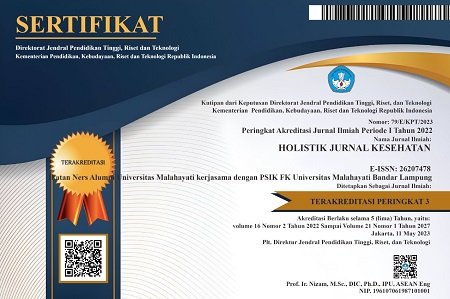Kecanduan game online dengan stres akademik pada siswa SMP
Abstract
Online game addiction and academic stress among junior high school students
Background: Online games are currently rife in society, enthusiasts ranging from children to adults. Online games have a tendency to make players interested in lingering in front of the computer to forget about study time, meal time, sleep time, and contact the environment in the actual world because they spend more time in cyberspace. Game addiction is as if the player has nothing to do but play the game, and as if the game is his life. Students will find it difficult to manage time and meet academic demands during their schooling. This raises academic stress, which is defined as a condition or condition of individuals who experience pressure because of students' perceptions and assessments of academic stressors. This is due to the many academic demands that must be faced, for example, exams, and assignments.
Purpose: To determine the relationship between online game addiction and academic stress among junior high school students.
Method: A quantitative study with correlational design. The sample of 500 students (junior high school students) in Bandar Lampung as respondent and taken by accidental sampling. The questionnaire data collection is using Google Form (G Form). The analysis by Spearman test and bivariate.
Results: Finding a significant relationship between game addiction and academic stress with a correlation coefficient of 0.174, so this value that means a weak relationship between online game addiction and academic stress. The correlation coefficient was positive so that the relationship between the two variables is unidirectional, thus it means that the higher the level of online game addiction, the academic stress level will also get worse.
Keywords: Addiction; Online game; Academic stress; Junior high school students
Pendahuluan: Game online saat ini marak di masyarakat, peminatnya mulai dari anak kecil sampai orang dewasa. Game online memiliki kecenderungan membuat pemainnya tertarik berlama-lama di depan komputer hingga melupakan waktu belajar, waktu makan, waktu tidur, dan melakukan hubungan dengan lingkungan di dunia nyata karena mereka lebih banyak menghabiskan waktunya di dunia maya. Kecanduan game adalah pemain seakan-akan tidak ada hal yang ingin dikerjakan selain bermain game, dan seolah-olah game tersebut adalah hidupnya. Siswa akan kesulitan mengatur waktu dan memenuhi tuntutan akademik selama mereka sekolah. Hal tersebut menimbulkan stres akademik yang diartikan sebagai suatu kondisi atau keadaaan individu yang mengalami tekanan sebagai hasil persepsi dan penilaian siswa tentang stressor akademik. Hal tersebut dikarenakan banyaknya tuntutan akademik yang harus dihadapi, misalnya ujian, tugas-tugas dan lain sebagainya.
Tujuan: Untuk mengetahui hubungan kecanduan game online dengan stres akademik siswa SMP.
Metode: Penelitian kuantitatif dengan desain korelasional. Penelitian ini menggunakan sampel 500 responden siswa Sekolah Menengah Pertama (SMP). Dianalisis dengan menggunakan Uji Spearmen.
Hasil: Diketahui bahwa terdapat hubungan signifikan antara kecanduan game dengan stres akademik dengan Koefisien korelasi sebesar 0,174, maka nilai ini menandakan hubungan yang lemah antara kecanduan game online dengan stres akademik. Angka koefisien korelasi bernilai positif sehingga hubungan kedua variabel tersebut bersifat searah, dengan demikian dapat diartikan bahwa semakin tinggi tingkat kecanduan game online maka tingkat stress akademik juga semakin parah.
Keywords
References
Barseli, M., Ifdil, I., & Nikmarijal, N. (2017). Konsep stres akademik siswa. Jurnal Konseling dan Pendidikan, 5(3), 143-148.
Cooper, A. (2013). Cybersex: The dark side of the force: A special issue of the Journal Sexual Addiction and Compulsion. Routledge.
Gaol, N. T. L. (2016). Teori stres: stimulus, respons, dan transaksional. Buletin Psikologi, 24(1), 1-11.
Griffiths, M. D., & Davies, M. N. O. (2005). Videogame Addiction: Does It Exist? Handbook Of Computer Game Studies. J. Goldstein, J. Raessens
Keswara, U. R., Syuhada, N., & Wahyudi, W. T. (2019). Perilaku penggunaan gadget dengan kualitas tidur pada remaja. Holistik Jurnal Kesehatan, 13(3), 233-239.
Kuss, D.J. and Griffiths, M.D., 2012. Internet gaming addiction: A systematic review of empirical research. International Journal of Mental Health and Addiction, 10(2), pp.278-296.
Kusumawati, R., Aviani, YI., & Molina, Y. (2017). Perbedaan Tingkat Kecanduan Game Online Pada Remaja Ditinjau dari Gaya Pengasuhan. Jurnal RAP Universitas Negeri Padang. 8 (1). 88-99
Lee, I., Yu, C. Y., & Lin, H. (2007). Leaving a Never-Ending Game: Quitting MMORPGs and Online Gaming Addiction. In DiGRA Conference.
Masya, H., & Candra, D. A. (2016). Faktor-faktor yang mempengaruhi perilaku gangguan kecanduan game online pada peserta didik kelas x di madrasah aliyah al furqon prabumulih tahun pelajaran 2015/2016. KONSELI: Jurnal Bimbingan dan Konseling (E-Journal), 3(2), 103-118.
Misra, R., & Castillo, L. G. (2004). Academic stress among college students: Comparison of American and international students. International Journal of stress management, 11(2), 132.
Pande, N. P. A. M., & Marheni, A. (2015). Hubungan Kecanduan Game Online dengan Prestasi Belajar Siswa SMP Negeri 1 Kuta. Jurnal Psikologi Udayana, 2(2), 163-171.
Putra, A. N. R., & Tricahyono, D. (2020). Pengaruh Stres Dan Kecanduan Video Game Terhadap Prestasi Akademik (studi Kasus Mahasiswa Universitas Telkom). eProceedings of Management, 7(2).
Rahman, K., & Rahmandani, A. (2019). Hubungan Antara Kecanduan Game Online Dengan Kecemasan Akademik Pada Mahasiswa Pemain Game Online Di Game Center Kecamatan Banyumanik, Kota Semarang. Empati, 8(2), 153-157.
Rohman, K. (2018). Agresifitas Anak Kecanduan Game Online. Martabat, 2(1), 155-172.Santrock, J. W. (2002). Life span development: Perkembangan masa hidup. Jakarta: Erlangga,31.
Sari, A. P., Ilyas, A., & Ifdil, I. (2017). Tingkat kecanduan internet pada remaja awal. JPPI (Jurnal Penelitian Pendidikan Indonesia), 3(2), 110-117.
Wan, C. S., & Chiou, W. B. (2006). Psychological motives and online games addiction: Atest of flow theory and humanistic needs theory for taiwanese adolescents. CyberPsychology & Behavior, 9(3), 317-324
Weinstein, A. M. (2010). Computer and video game addiction—a comparison between game users and non-game users. The American journal of drug and alcohol abuse, 36(5), 268-276.
Yanti, N. F., Marjohan, M., & Sarfika, R. (2019). Tingkat Adiksi Game Online Siswa SMPN 13 Padang. Jurnal Ilmiah Universitas Batanghari Jambi, 19(3), 684-687.
Young, K. (2009). Understanding online gaming addiction and treatment issues for adolescents. The American journal of family therapy, 37(5), 355-372.
Zaelani, A. F., Setiawati, O. R., & Lestari, S. M. P. (2019). Hubungan Kecanduan Bermain Game Online Dengan Depresi Pada Siswa SMP. Jurnal Psikologi Malahayati, 1(2), 35-41.
DOI: https://doi.org/10.33024/hjk.v15i1.3433
Refbacks
- There are currently no refbacks.
Copyright (c) 2021 Holistik Jurnal Kesehatan

This work is licensed under a Creative Commons Attribution-NonCommercial 4.0 International License.














